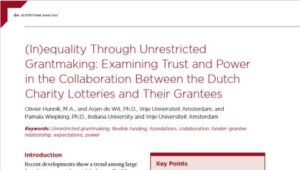When a donor provides unrestricted funding, there are no formal restrictions on the choices that grantees can make with their grant. However, sociological literature learns that there can still be invisible and hidden power at play. Olivier Hunnik, master graduate at Vrije Universiteit Amsterdam, lead-authored a peer-reviewed article on explicit and implicit expectations in the collaboration between the Dutch Charity Lotteries and their grantees.
The article appeared in a special issue on ‘Shifting Power in Philanthropy’ of The Foundation Review, published August 2021.

Key Points
Since 1989, the Dutch Charity Lotteries have provided multiyear unrestricted funding, a type of grantmaking that is fairly unique for the Netherlands, to a wide range of nonprofits at home and abroad. This article shares insights into how unrestricted grantmaking influences the relationship between funders and grantees, specifically highlighting how staff at a sample of grantee organizations experience collaboration with this large social enterprise. It discusses hidden and invisible power dynamics that exist in the relationship, even when there are few formal restrictions on grantees’ spending.
Grantee representatives interviewed for this study stated that openness and honesty in communication with the Dutch Charity Lotteries leads to mutual trust, and that they experience few formal restrictions. Nevertheless, even unrestricted funding may come with stated or unstated expectations from the funder, and many grantees reported that receiving the grant support leaves them with a sense that they have to “prove they’re worth it.” Relaxing formal restrictions gives rise to some uncertainty about what grantees actually have to “prove.”
To ensure a more equal collaboration, it is advisable for foundations to try to detect and consider expectations that are explicit and implicit, conscious and unconscious, and address these. This article offers suggestions for how foundations can do so.


